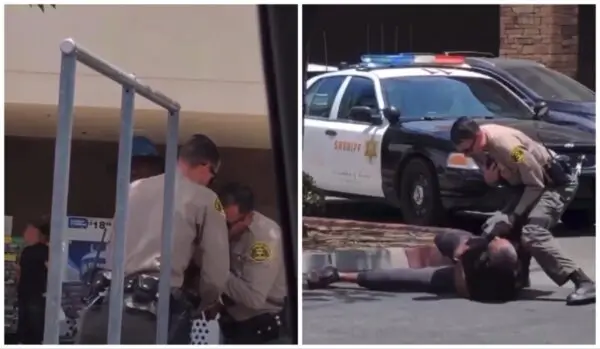L.A. Deputy Who Bodyslammed Black Woman, Pinned Knee on Her Neck, and Pepper-Sprayed Her for Filming Arrest to Only Serve Four Months In Prison After Trump Ally Intervenes
A former Los Angeles County deputy facing 10 years in prison will instead only serve four months following intervention from an unlikely source.
It wasn’t Trevor Kirk’s lawyers who secured the much lighter sentence after the judge agreed to drop the felony count of deprivation of rights under color of law. He did so at the request of the Justice Department, which prosecuted the case.
Confused? Well, even though the prosecutors didn’t change, and no new evidence had surfaced that might lead to a different outcome, the new interim U.S. Attorney for Los Angeles, Bill Essayli, a loyal Trump ally, seemed more sympathetic to the defense. Kirk’s reduced sentence wouldn’t have happened had Essayli not ordered his prosecutors to offer Kirk a misdemeanor plea deal even though they had already secured his felony conviction.

A month earlier, Essayli offered the deputy, who was fired by the county, a plea deal that would reduce his sentence from 10 years to one year.
Several prosecutors in the L.A. office resigned in protest, while police watchdogs were left to wonder whether law enforcement would be held accountable in cases involving excessive force.
“In my view, the jury verdict was fully supported and the case was not unfairly argued, as the government at some early point argued,” Judge Steven V. Wilson said after handing down his sentence. “The job of a police officer is a very difficult one … but with those factors in mind, there is a responsibility to act appropriately.”
Kirk’s case dates back to June 2023, when the deputy and his partner Kirk and his partner detained a man who matched the description of a suspected robber at the WinCo Foods grocery store.
A female shopper, identified by prosecutors as J.H., witnessed the man’s apprehension and pulled out her cellphone to record it. She advised Kirk that he could not hold the suspect until he gave him a legal basis for his arrest.
Kirk responded angrily, as observed on bodycam video. In court, the prosecution outlined the interaction, telling jurors Kirk approached J.H. and tried to grab her phone without her permission. As she turned away, the now ex-deputy grabbed her arm, hooked his left hand behind her neck, and tossed her to the ground, face first.
But he didn’t stop there. Kirk held the woman down by placing his knee on her shoulder, and when she begged him to stop, he responded by cocking his right arm back and producing a clenched fist, along with a warning: “Stop or you’re gonna get punched in the face,” according to prosecutors.
The woman continued to struggle, telling Kirk she couldn’t breathe. Without warning, Kirk repeatedly pepper-sprayed J.H. in the face while his knee remained pressed against her neck. He was also concocting a false narrative, telling his fellow deputies on his police radio that he had been involved in a fight with the woman, who was treated for head trauma caused by blunt force and other injuries to her head, arms, and wrist.
Jurors reached a verdict after only an hour of deliberations. The assault was captured on video, leaving the defense with little wriggle room. So why would Essayli undermine what had been a successful prosecution?
Many observers believe he was just acting on orders from President Donald Trump, even though the U.S. Attorney’s office is supposed to act totally independently of the executive branch. In March, speaking to a joint session of Congress, the president vowed to give police officers nationwide “the support, protection and respect they so dearly deserve.”
“They have to get it. They have such a hard, dangerous job,” Trump said. “But we’re going to make it less dangerous. The problem is the bad guys don’t respect the law, but they’re starting to respect it, and they soon will respect it.”
Later in his speech, Trump called on Congress to pass a new crime bill aimed at “getting tougher on repeat offenders while enhancing protections for America’s police officers so they can do their jobs without fear of their lives being totally destroyed.”
Trump also recently signed a somewhat vague executive order that he vowed would serve to “unleash” law enforcement.
The president didn’t say how pardoning the Jan. 6 rioters who attacked Capitol police as they gained entry into the Capitol building demonstrated “support, protection, and respect.”
Tom Yu, an attorney representing Kirk, said the defense plans to appeal Wilson’s earlier denial of their motion for an acquittal.

